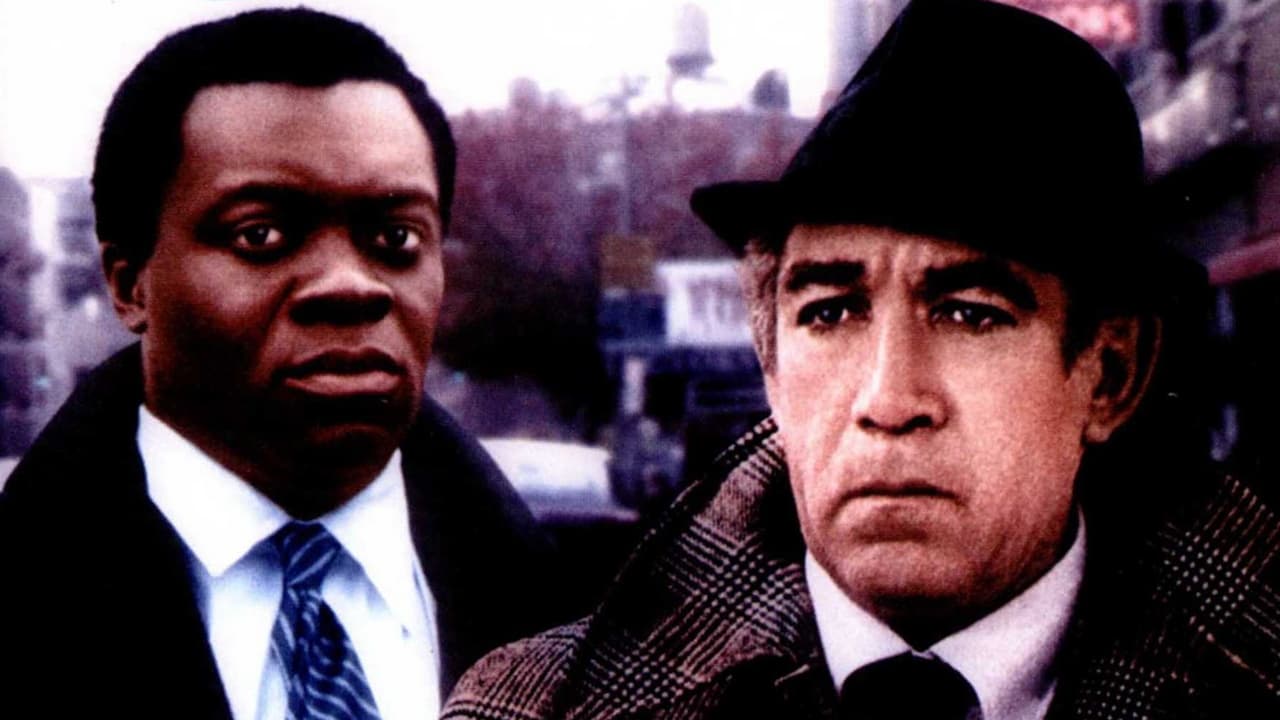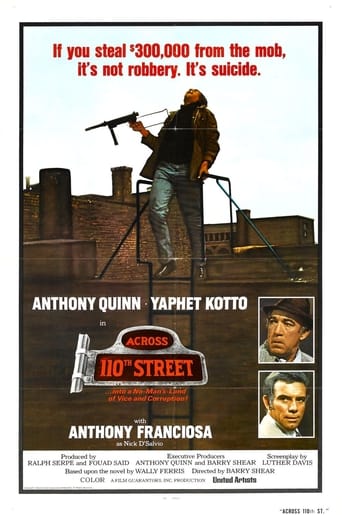



just watch it!
One of those movie experiences that is so good it makes you realize you've been grading everything else on a curve.
View MoreAmazing worth wacthing. So good. Biased but well made with many good points.
View MoreLet me be very fair here, this is not the best movie in my opinion. But, this movie is fun, it has purpose and is very enjoyable to watch.
View MoreThree black hoodlums break into an apartment in Harlem where the Italian Mafia is collecting their proceeds for the week from their local black henchmen. A gunfight breaks out and all of the Mafia members are killed. Responding to the commotion two police officers are also gunned down by these same gunmen who manage to get away with $300,000 of the Mafia's money. This causes quite a stir within the Mafia as they fear losing control of Harlem to local black gangsters. So "Nick D'Salvio" (Anthony Franciosa) is sent into Harlem to find those responsible and make an example of them. Likewise, the police also want to bring these three men into custody for killing two of their own. So with both the Mafia and the NYPD looking for them the odds against any of these three crooks getting away are pretty slim. Especially since one of them, "Henry J. Jackson" (Antonio Fargas) makes no effort to hide his newly gotten wealth. Anyway, this film is notable for showing Harlem from a certain perspective that is not too kind. It is dirty and gloomy. But in the process it adds a sense of realism to everything. Both Anthony Quinn (as "Captain Mattelli") and Yaphet Kotto ("Lieutenant Pope") perform in an adequate manner in spite of the fact that their characters are obvious Hollywood creations. However, one thing I didn't care for was the last scene at the end which I thought was completely unnecessary. But that's just my opinion. In short, I rate this film as slightly above average.
View More110th Street between 5th Avenue and Central Park West marks the Northern limit of one of the most beautiful parks in any urban setting. To the North of the park begins a vast area better known as Harlem. Of course, the Harlem of today, with its gentrified parts, is a completely different area than it was in the 1970s when drugs were more prevalent and conditions were worse than today.This story takes us to that era where two Italian mafia men come to get the money from the drug trade. Unknown to them, three black residents of Harlem have prepared a stick up to rob the proceeds from the sale of dope to the mostly black users. One of the two would be robbers, with a machine gun eliminates the two Italians and some of their local dealers. The get away involves killing a police officer on the street.A local Harlem police, Lieutenant Pope takes charge in the investigation. The appearance of Capt. Mattelli challenges Pope about his authority. Mattelli, a dirty cop, has a lot at stake. He is being paid handsomely to look the other way by Doc Johnson, who controls a lot of the criminal element working for him. The police get lucky when they find one of the trio who has gone into a bar flaunting his newly found money. He leads them into not only the attention of the police, but to Nick D'Salvio, the son-in-law of the mafia boss. D'Salvio wants to get to the guys that stole the money, at whatever cost. He is a man without scruples who will stop at nothing.The two remaining robbers are a product of the poverty of the area. Out of desperation they had committed the crime, figuring they were taking the money from bandits that were enslaving the locals with the drugs they were pushing. Eventually, all the men meet their death either from D'Salvio, or the police.One of the best examples of the blaxploitation genre, the film had values in the way director Barry Shear opened up the film by taking the action into the streets of Harlem with the dilapidated tenements, poverty, filth, and desperation. The result is a film that is exciting to watch today to get a real feeling what those mean streets looked like during a period when lawlessness reigned freely. It also serves as a social commentary about how the whites, in the case of Mattelli and the Italian mafiosi used the black population to push their deathly drugs to people that could ill afford them.Anthony Quinn does a credible job as Mattelli. Anthony Franciosa was at his best portraying the sadist D'Salvio. Yaphet Kotto appears as Lt. Pope. There are some excellent acting from some of the supporting players like Richard Ward, Paul Benjamin, Ed Bernard and Antonio Fargas, just to name a few.Jack Priestley took his cameras to a part of Manhattan most people never venture into, capturing in great detail the flavor of the area.
View MoreSet in the mean streets of Harlem, "Across 110th Street" is one of the better blaxploitation films released in the early seventies. With two fairly big stars in lead roles (Anthony Quinn and Yaphet Kotto), the film also had a slightly larger budget than most of its siblings.The plot revolves around two detectives, played by Kotto and Quinn, who attempt to bring down a black gang. Unfortunately things don't go as planned, mostly because Kotto is black and Quinn is a racist Italian. Written, directed and produced by whites, this film pretends to make a racial statement (the last shot is that of a white on black handshake), but like most of these white-directed blaxploitation films, it's all rage and anger, everyone despicable, nasty and vile.The film ends with a massive shootout (lots of squibs and submachine guns) that was memorable in its day. Today the film is remembered mostly for influencing Tarantino's "Jackie Brown", particularly its opening shot.6/10
View MoreSkirting at least some of the clichés of blaxploitation, ACROSS 110TH STREET is an entertaining mess. Anthony Quinn and Yaphet Kotto play NYC cops and unlikely partners trying to find out who stole some mafia loot and killed a couple of cops in the process. Anthony Franciosa is an inept low-level mafiosi also hunting for the culprits. Quinn and Kotto are actually pretty dull, but Paul Benedict gives an electrifying performance as the lead thief. He's well matched with Norma Donaldson as his sympathetic wife. Antonio Fargas also appears in a brief, and of course, flamboyant role. It's a ridiculous and violent time-capsule capturing the nearly bankrupt NYC of the early 1970s...and it's tough to beat that Bobby Womack music. Directed by Barry Shear, who came from television and promptly went back to television.
View More